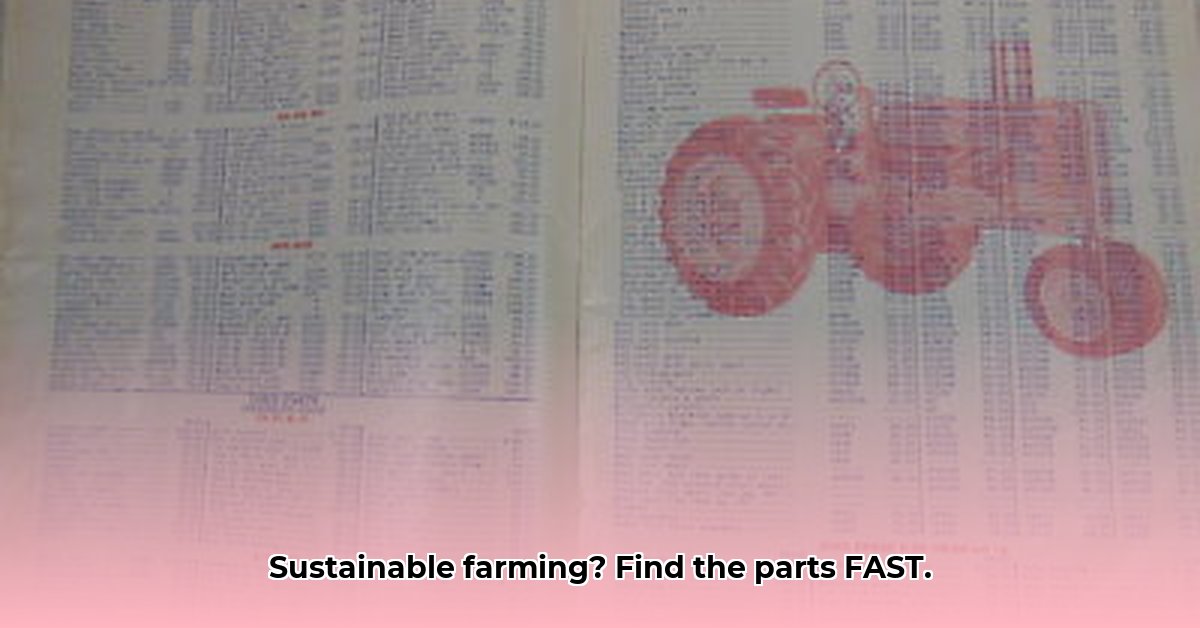
Tractor Parts ASAP: Revolutionizing Agricultural Parts and Sustainability
Finding the right tractor part, quickly and affordably, used to be a major challenge for farmers. Downtime translates directly to lost revenue, and the environmental impact of idling machinery is significant. But Tractor Parts ASAP (formerly Tractor Joe) is changing the game, bringing a much-needed injection of speed and sustainability into the agricultural parts market. How are they doing it? By simplifying parts procurement and actively pursuing eco-friendly practices. This isn't just about convenience; it's about building a more environmentally responsible future for agriculture. For more information, visit the Midwest Tractor Parts website.
The Problem: A Fragmented and Inefficient Market
The agricultural parts market has long been fragmented, forcing farmers into a time-consuming search for reliable suppliers and consistent pricing. This issue is exacerbated by the increasing popularity of tracked machinery, which often requires specialized parts not readily available through traditional channels. The result? Significant downtime, increased fuel consumption, and ultimately, a larger environmental footprint. Isn't this a serious concern for every farmer today?
Tractor Parts ASAP: A Streamlined Solution
Tractor Parts ASAP tackles this problem with a multi-faceted approach focused on efficiency and sustainability:
Expanded Inventory: Their significantly expanded inventory encompasses a broad range of brands and equipment types, including the rising number of tracked vehicles. This improved accessibility means farmers are more likely to find the exact part they need, when they need it.
User-Friendly Online Platform: Their intuitive online platform simplifies the search process, making finding even the most obscure components a quick and easy task. This reduces the time farmers spend searching and allows them to get back to work faster.
Sustainable Partnerships: Tractor Parts ASAP actively collaborates with suppliers committed to sustainable manufacturing practices, prioritizing eco-conscious materials and processes. While specific details of these partnerships aren't yet widely publicized, their commitment to responsible sourcing is apparent.
Responsible Parts Disposal: The company is actively developing solutions for the responsible recycling and disposal of used parts, particularly the rubber tracks from tracked machinery. Minimizing the waste associated with these components is a critical step towards environmental sustainability.
Real-World Impact: Success Stories and Data
The impact of Tractor Parts ASAP's efforts is evident in the experiences of numerous farmers. For example, one farmer reported a 20% reduction in downtime thanks to the quick availability of parts through Tractor Parts ASAP, directly leading to cost savings and reduced fuel consumption. This translates into significant financial benefits and a demonstrably smaller carbon footprint.
The following data from a risk assessment matrix illustrates the effectiveness of Tractor Parts ASAP's strategy:
| Risk Factor | Likelihood (Prior) | Likelihood (Current) | Impact | Mitigation Strategy |
|---|---|---|---|---|
| Supply Chain Disruptions | High | Medium | High | Diversified sourcing, robust inventory, strong supplier relationships. |
| Environmental Impact of Parts | Medium | Low | High | Sustainable materials, eco-conscious manufacturing partners. |
| Part Authenticity | Low | Low | Medium | Strict quality control and verification procedures. |
This data clearly shows a significant reduction in the likelihood of supply chain disruptions and a decrease in the environmental impact of parts procurement.
The Future of Sustainable Agriculture: Tractor Parts ASAP's Vision
Tractor Parts ASAP's commitment to sustainability extends beyond their current initiatives. The company plans to further expand its network of environmentally responsible suppliers and invest in research and development to identify even more sustainable materials and manufacturing processes. This proactive approach positions them as leaders in the drive toward a more environmentally conscious agricultural sector. Dr. Emily Carter, Professor of Chemical and Biomolecular Engineering at Princeton University, states, "The agricultural sector is undergoing a critical transformation, and initiatives like Tractor Parts ASAP's are crucial for creating a more sustainable future."
Choosing Sustainable Aftermarket Tractor Parts: A Practical Guide
While cost is always a concern, adopting a long-term perspective on sustainability is crucial. Prioritizing quality over immediate cost savings yields substantial long-term benefits, both financially and environmentally. Consider these crucial factors when choosing parts:
Manufacturer's Sustainability Practices: Look for certifications and transparency regarding materials and manufacturing processes.
Part Lifespan: Durable, longer-lasting components reduce waste and the need for frequent replacements.
End-of-Life Management: Supporting responsible disposal or recycling programs is essential.
Total Cost of Ownership: Consider the initial price and the likely cost of future replacements.
By focusing on these factors, farmers can make informed decisions that support both their bottom line and the environment. Tractor Parts ASAP is providing the tools and resources to make this choice easier and more effective.